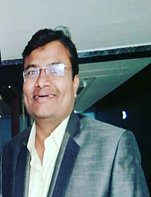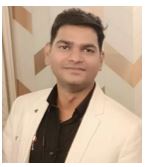Keynote Forum
Sambhaji Chintale
JALNA MUHS NASHIK UNIVERSITY IndiaTitle: OUR EXPERIENCE OF MANAGEMENT AND REHABILITATION OF 150 CASES OF RHINO ORBITO CEREBRAL MUCORMYCOSIS IN POST COVID PATIENT
Abstract:
Mycology is study of fungi, a diverse group that comprises if moulds, yeast, mushroom and related organism. Over 100000 species are recognized as of which 100 are identified as pathogenic for human and animals. Fungi are eukaryotic organism which differ from bacteria and other prokaryotic organism in many ways. Mycosis, an infection caused by fungi, generally depends on the state of the host defence system, the route of exposure and the virulence of the fungus. Amongst the mycosis, mucormycosis is the most invasive form of leading to higher morbidity and mortality.Several novel therapeutic strategies are available. These options include combination therapy using lipoidal bases amphotericin within an echinocardin or with azole or with all three. The underlying principle of therapy for this disease remains rapid diagnosis, reversals of underlying predisposing cause and urgent surgical debridement. This fungus is ordinarily saprophytic, but can become an aggressive pathogen under the appropriate condition, usually a series predisposition in the host .Mucor is almost always seen in the patient with immunodeficient status .the most common risk factor in these patient is diabetes mellitus. These patients comprise almost 70% of patient with Mucor. These patients are usually keratoacidotic from poorly controlled diseases .The second most common underlying predisposing conditions are renal diseases which are either chronic renal failure or that patient who are post-transplant and desferoxamine an iron or aluminum chelating agents.
Biography:
Sambhaji Govind Chintale, is currently working as an Associate Professor in ENT Department at JIIUs Indian Institute of Medical Science & Research. He is an Associate Professor in Muhs Nashik University and Director at Cosmo ENT Super speciality Hospital. He is Speaker for many National and International conferences and a member for Indian Medical Association, Association of Otolaryngologist of India, American thyroid association, Indian society of thyroid surgeon and Asia pacific thyroid society.
Sunil Hariram Pal
A.S.S. Ayurved Arogyashala Rugnalaya IndiaTitle: The Importance of Different Cultural Competence in Pain and Palliative Care
Abstract:
Managing pain is often a challenge for health professionals. This challenge is compounded when the patient in pain is dying. Living in an ethnically and culturally diverse society requires healthcare providers to respect and take into account the particular cultures from which their patients come. Health professionals and teams who learn the nuances of culture are rewarded with the knowledge they have been more effective in managing their patients' pain. Also, they are better able to help the family and friends of their patients adjust to the dying process. Keeping in mind the beliefs, experiences, and values of the patients and their families improves the quality of the medical care provided. Pain is perceived by the patient, and can only be reported by the patient. Pain is, therefore subjective, and, depending on the verbal skills of the patient, can be difficult to describe. Putting pain into words requires a degree of self-awareness and is coloured by the cultural background of the patient. Pain is a common symptom of many diseases and is often experienced at the end of life. Studies have shown as much as half of those dying experience moderate to severe pain in the final months of life. For the health practitioner, this highlights the importance of frequent pain assessment, pain management, and adjustment of pain medications. Palliative care relieves suffering in patients with life-threatening illnesses and maximizes their quality of life. Palliative care may be necessary for those diagnosed with cancer, degenerative neurologic diseases, painful neurologic diseases, and those diagnosed with chronic obstructive pulmonary disease to relieve symptoms of breathlessness. Hospice or end-of-life palliative care is often provided to dying patients, particularly during the final months of life.
Biography:
Sunil Hariram Pal is from Mumbai, Bandra.He Done his Undergraduate from Bangalore in B.A.M.S from Rajiv Gandhi University of Health Science. Now he is doing Postgraduate in Medicine from Maharashtra University of Health Sciences, Nashik


